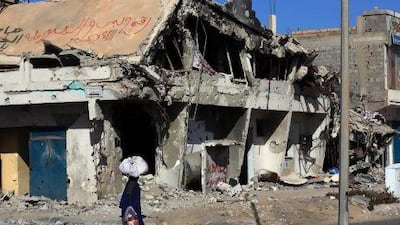SIRTE // As first-year students mill around the entrance of the University of Sirte, a huge concrete sculpture of an eagle towers above them, its green paint only a little chipped by the artillery shells that targeted it when Muammar Qaddafi's hometown fell to rebels last year.
Green was the longtime ruler's favourite colour and the eagle symbolised his strength.
Here in his birthplace, young people are split between those who cheered the revolution that toppled the dictator and those who had to be discouraged by university guards from celebrating the former leader's birthday on June 7 with cake and green banners.
"It's been one year and this is all we argue about: how Libya should be," said one engineering student.
"We fight all the time!" his friends chime in, staging a mock scuffle to demonstrate.
Since Qaddafi was killed by a mob more than a year ago, after he was flushed from his hiding place in Sirte and found hiding in a drain, the country he ruled for four decades has tried to move ahead.
Many of his family members and allies have been jailed or fled abroad, and the country has elected a legislature that is undertaking the daunting task of creating new institutions of government and reversing Libya's long international isolation.
But in this town, where security officials estimate up to 90 per cent of its 75,000 people were loyal to the late leader, nostalgia for the old days lingers, and there is little sign of the reconciliation that leaders and citizens say is essential for a peaceful future.
"We have a saying," said Mohammed Al Forjany, a cafe owner on the seafront. "The revolution was started by the reckless, led by the brave and benefited the cowards."
In nearby District Two, the neighbourhood where Qaddafi hid for weeks as his enemies closed in, the fighting was relentless and killed many families, he added.
The new leadership in Tripoli, said Mr Al Forjany, cannot simply ignore this suffering, however bitter it remains towards Qaddafi and his regime.
"The people who supported the last regime are about half of the Libyan people. We can't put them all in prison," he said.
Still, how to deal with the crimes of the Qaddafi era is a thorny issue in Libya, and nowhere is it more acute than in Sirte, which owes much of its prosperity to the dictator's largesse.
In now establishing who should be held accountable for those wrongs and how, where should the line be drawn?
Mr Al Forjany endorsed the uprising against Qaddafi, but argued that the dictator's supporters who have been jailed without charge should be released to start the process of healing the country.
In District Two, the neighbourhood with the greatest concentration of loyalists, there is hardly a house untouched by gunfire, and many have been reduced to rubble of concrete and girders.
Here, many people feel that they have been unfairly punished for their support of Qaddafi, and fear for their future under the control of the new security and political establishment.
"I can't tell you that everyone likes the new Libya," said Hamza Al Hammali. He owns a carpet shop that he had to renovate after it was burnt.
"Before, weapons weren't so widespread, but now there's a war and everyone is looking out for his own interests."
Rolls of colourful rugs glowed in the electric light behind him, but business was bad - furnishings were the last things on his neighbours' minds.
Pointing to nearby shops that had been recently attacked, he said revenge killings were common.
He burst out laughing when told the local council leader had said that only three people had died violently in the town in the past year.
He estimates about 400 have been kidnapped or killed.
Many of the people in the neighbourhood still keep pictures of Qaddafi in their houses, he said. Indeed, some were part of the leader's extended family. "It is hard for them to forget him," he added.
This tension between the old guard and the new establishment reverberates with various degrees of violence across the country.
In October, there were military operations in Bani Walid, a town to the south-east of Tripoli where Qaddafi historically enjoyed strong support. The fighting resulted in the deaths and arrests of dozens of people who security officials described as vengeful loyalists.
The officials said Bani Walid is now under control and that security is being maintained by military units from elsewhere, rather than local government-affiliated militias as is the norm in most cities.
But while there has been less violence in Sirte than in Bani Walid, the allegiances to the old regime do not fade easily. Sirte residents said there had been clashes between pro- and anti-Qaddafi gunmen during the Bani Walid operations.
Here, too, many of the people providing security are not from the area, and resentful residents sometimes shoot at them.
The head of the local council in Sirte, Ali Al Labaz, said he spent 20 years opposing the regime.
The local anti-Qaddafi forces appointed him to the job by acclamation, as there was no legislation in place setting out how to choose local leaders.
A thin man of 66, with eyes magnified by thick glasses, Mr Al Labaz almost disappears as he sits on a large, tan-coloured sofa in an office with soaring ceilings. But he takes a strong line on the town's future.
The situation in Sirte is good, he said. Qaddafi's supporters are the majority but they are too afraid of being killed to cause trouble.
"The loyalists are not OK with the situation but they can't do anything about it," he said. "They are like someone who has lost a loved one, who cries for days. But eventually they forget."
"I feel sorry for them," he added. "But I think they are stupid. How can they be loyal to someone who kills people?"

